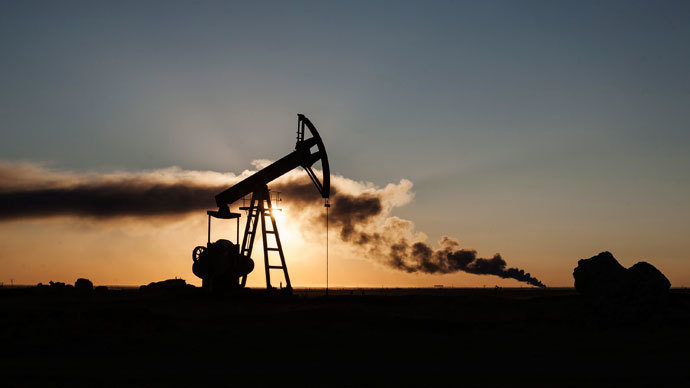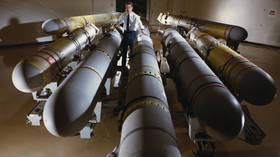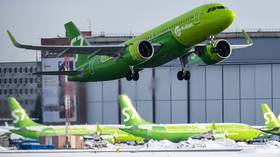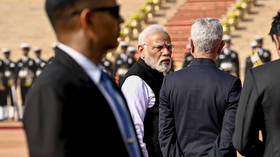Syria attraction: Russia moving into Eastern Mediterranean oil bonanza

The wars for control of Syria, and actually there is more than one going on simultaneously, have a strong background in an undeclared war over who will control the region’s gigantic and newly-discovered oil and gas reserves.
Now, Russia has just secured a major contract with the Syrian government. This comes after they brilliantly handed President Obama a face-saving way out of unwanted direct military action in Syria by brokering a deal with Syrian President Bashar Assad to remove the country’s stock of chemical weapons. Regardless of whether Assad remains president, Russia holds exploration and development rights to a major part of Syria’s offshore waters.
On December 25, Syrian Oil Minister Suleiman Abbas on behalf of the Syrian government signed a 25-year deal with the Russian SoyuzNefteGaz company to explore for oil in the Middle Eastern country's territorial waters off the Mediterranean coast. SoyuzNefteGaz is headed by Russia's former energy minister, Yuri Shafranik, and its main shareholder is the Central Bank of Russia. It was founded in 2000 "to enhance economic cooperation with former Soviet countries, the Middle East and North Africa," according to RIA Novosti, the state Russian news agency. It also has projects in Iraq and Uzbekistan.
The Syrian deal is part of Putin’s long-term strategy in the region, in other words.
The new agreement covers an 845-square-mile [2,188 square kilometers] area stretching southward from the government-controlled city of Tartus, where Russia also has its only Naval base in the Mediterranean. The rights extend to Banias, and about 45 miles into the Mediterranean in the Syrian Exclusive Economic Zone. The Russian company has been involved for a number of years in onshore oil projects in Syria.
Mediterranean energy scramble
With the move to develop Syria’s offshore energy potential, Russia is stepping into a hot and rapidly developing scramble for what are estimated to be oil and gas reserves comparable to one or more new Saudi Arabia-size regions. A look at the offshore map of the region would be revealing.
Since it discovered significant gas in its offshore waters in 2010, Israel has become a major player in the development of oil and gas in the Eastern Mediterranean, including in Cyprus which has confirmed significant gas fields of its own. Lebanon’s offshore exploration has been disrupted (perhaps conveniently for some rivals) by the war in Syria, as has Syria’s own oil and gas exploration.

In 2009, the Emir of Qatar went to Damascus to negotiate an agreement with President Bashar Assad for a Qatari gas pipeline from their huge offshore gas field, North Dome, which is contiguous with the Iranian South Pars field in the waters of the Persian Gulf dividing the two countries. The South Pars/North Dome field is the world's largest gas field, shared between Iran and Qatar. Qatar, already the world’s largest liquified natural gas (LNG) producer, mainly for the Asian market, badly wants to get direct access to the booming EU gas market. Qatar’s proposition to Assad was to build a gas pipeline that would bring Qatari gas through Syria and into Turkey, a close Qatari ally. Assad refused, citing Syria’s strong energy relations with Russia.
In March 2011, Assad signed another gas pipeline deal: this time with arch-Qatar enemy, Iran. Qatar is fundamentalist Sunni and home to the radical Muslim Brotherhood. Iran is fundamentalist Shiite Muslim and Iraq is ruled by a Shiite Prime Minister. Both Iran and Iraq back Assad in the current war for control of Syria. The Iranian gas pipeline would extend from its Persian Gulf field through Iraq and through Syria. No sooner was the ink dry on the Iran-Iraq-Syria gas pipeline when a full-scale terror war, financed by Qatar to the tune of billions of dollars, exploded across Syria.
Now Russia has stepped in, after the failure of Qatar, the Saudis and Turkey to topple the Assad regime and replace it, either with a fundamentalist Wahabite Saudi regime or a fundamentalist Salafist Muslim Brotherhood, one that would do business with them and not with Russia.
The statements, views and opinions expressed in this column are solely those of the author and do not necessarily represent those of RT.
The statements, views and opinions expressed in this column are solely those of the author and do not necessarily represent those of RT.













